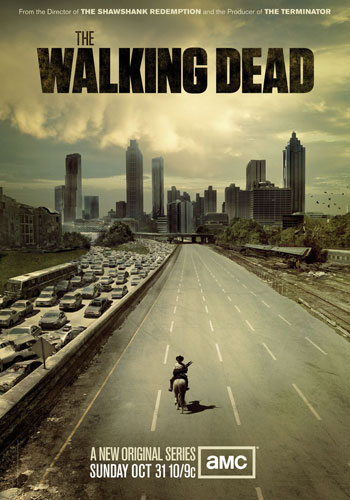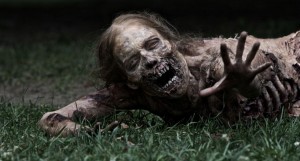 The television series The Walking Dead premiered last Sunday, Halloween night, and I thought before the second episode this weekend I’d share a few reflections.
The television series The Walking Dead premiered last Sunday, Halloween night, and I thought before the second episode this weekend I’d share a few reflections.
Given my interests and the social venues and media circles I travel in it was difficult not to become aware of this series. AMC did a masterful job of tapping into various forms of communication in order reach that segment of the population that would have the most interest in this kind of programming. This included not only ads on AMC, but also promotions in magazines like Rue Morgue, other elements of the horror community, and segments of the social networking site Facebook. The marketing then became viral and word of the series was circulated by thousands of horror and zombie enthusiasts. Scheduling the premiere on Halloween night was a brilliant move as well. The result, as reported by Slashfilm.com, was that The Walking Dead “was a gigantic win with not only the largest numbers in AMC’s history (well above Breaking Bad and Mad Men), but the largest 18-49 audience of any series premiere on any cable network this year. An estimated 5.3 million viewers watched the debut episode, and it scored 3.3 in the coveted adults 18-49 demo.”
My review of the promotional materials for the series on AMC’s website looked promising, not only in terms of the quality of its source material in the graphic novels of Robert Kirkman published by Image Comics, but also in terms of the project having director Frank Darabont at the helm, and featuring some good acting and amazing makeup effects that push the envelope for television horror. Even so I was still skeptical that this project would live up to the hype given the tendency of some zombie cinema to focus more on gore and novel zombie kills rather than character development and storyline. Thankfully, The Waking Dead exceeded my expectations and it was a great finale to my Halloween celebration.
There is a wealth of commentary available on the Internet on this series from various websites and blogs, but I’ll add my own thoughts to the mix.
One of the things I most appreciated about the premiere episode was the focus on the dramatic narrative of human relationships and survival in the midst of a horrific breakdown in the social order, and in relation to one of the most popular monstrous icons that embodies some of our greatest fears, rather than on a constant depiction of zombies consuming flesh. In terms of screen time, the zombies were featured in reserved fashion and the bulk of the episode focused on the struggles of the living in the midst of an undead apocalypse. I found this refreshing, and a nice change of pace from a few recent zombie films that go to great lengths to depict creative and many times over the top methods of zombie killing.
The first episode did a wonderful job of not only instilling fear in its audience, but also a sense of sympathy, not only for the living, but also for at least some of the zombies. A standout examples of this is a man who lost his wife to the contagion responsible for zombification who can’t bring himself to shoot her as she continually revisits the home where she previously lived with her husband and son. Both father and son are torn by these visits, the son having to hide his crying in his pillow as his late mother peers through the peephole of her former home, and her husband determined to end her undead suffering by a bullet through the head, but in the end unable to do so as he looks at her through a gun sight. But it is not only the human characters like these we feel sad for, but also some of the zombies. In this immediate instance the man’s dead wife continually hovers around the neighborhood and frequently visits the home where she had a connection and loved ones in life. In Romero’s Dawn of the Dead it was said that the zombies are us, in that film functioning in part as a critique of consumerism. In The Walking Dead the zombies are still us, but at times in ways that allow them to maintain a sense of connection to the living that results in our pity and sympathies.
 The makeup effects were amazing, and it was evident that the artists and makeup artists affiliated with the program spent a great deal of time, research, and detail in depicting death in various stages of decay. Some were downright horrific, as in the case of the crawling zombie woman with half a body who was the beneficiary of a mercy killing by Sheriff Rick Grimes.
The makeup effects were amazing, and it was evident that the artists and makeup artists affiliated with the program spent a great deal of time, research, and detail in depicting death in various stages of decay. Some were downright horrific, as in the case of the crawling zombie woman with half a body who was the beneficiary of a mercy killing by Sheriff Rick Grimes.
Another observation comes in the way in which some of the characters attempted to grapple with maintaining a sense of normalcy or connection to the previous social order with its breakdown as a result of the zombie apocalypse. Sheriff Grimes returns to the police station not only to pick up weapons and a patrol car to search for his family, but also chooses to wear his sheriff’s uniform. After Grimes encounters the father and son mentioned above, before sharing a meal the father has the small group pray and offer thanks for the meal and protection in their circumstance, and later, in order to distract his son from his killing of zombies the father instructs his son to read his comic books. All of these activities are rooted in the previous social order but are retained by the characters as a means of continuity with the past, and an attempt to impose familiarity and elements of order in the face of overwhelming chaos.
AMC promotes itself as a channel where “Story matters here.” This has certain been the case with its previous hit programming, and thankfully it has brought the same desire for good storytelling to this top-notch adaptation of graphic novels to the small screen. I look forward to enjoying the unfolding of the rest of the first season of The Walking Dead and hope that we have many more seasons to look forward to. Perhaps AMC and other channels will mine other graphic novels of horror, science fiction, and fantasy for future gems of television.





In the comic, Rick’s uniform is explicitly given a more practical rationale–he expects to find a somewhat functional society in Atlanta, and hopes that being a sheriff will give him an advantage in navigating any bureaucracy to find his wife and son.
Perhaps it functions in this way in the television adaptation and I didn’t make that connection. I have only thumbed through the graphic novel. Thanks for the thought, Curt.
Thanks for your response to Walking Dead. I definitely found the crawling zombie woman to be sympathetic, and I was touched by the scene where the man couldn’t shoot his zombie wife with the rifle. The scene with the horse really hurt, though–I hated that. I’m also curious to see how the love triangle will play out between his wife and partner. Like you say, definitely lots of interesting dynamics in the relationships between the characters as well as psychological development–that stuff really balances out the gruesomeness. A very different take on a zombie story world than say Zombieland, which I think you are alluding to. I find this much more fulfilling. I liked it so much, I’m actually considering getting cable–AMC is only going to stream the pilot (that’s where I watched it)–it’s going to be a long wait for the DVD.
Thanks for your thoughts, Chad. In terms of some zombie films focusing on dramatic zombie kills I was referring not just to Zombieland, which I enjoyed, but some of Romero’s latest films and those by others where there seems to be an attempt to depict more dramatic, creative, and over the top zombie kills. Just think of the scene in Diary of the Dead where the living us a defibrillator to kill a zombie as its eyes shoot out of its head. Less story and character and more gore seems to be the prevalent formula for which The Walking Dead is a corrective.